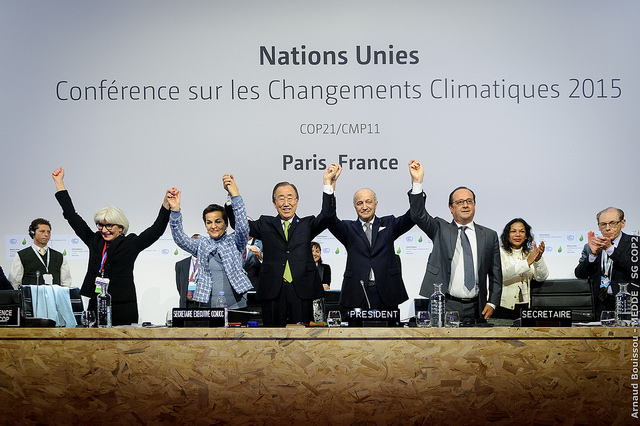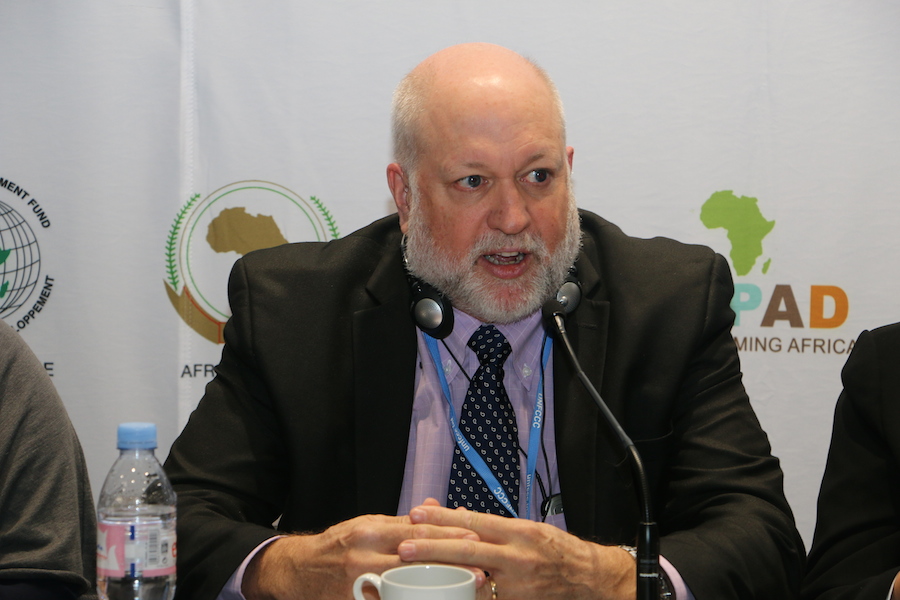
By Atâyi Babs in Paris
Reactions have continued to trail the Paris climate agreement which was ratified earlier today by about 196 countries at the twenty-first conference of the United Nations Framework Convention on Climate Change (UNFCCC).
While some were laudatory and cautionary, others condemned the deal which seeks to spur a transformation of global growth and development and opening vistas to a low-carbon and sustainable future.
UN Secretary General, Ban Ki-moon sees the deal as “a monumental success for the planet and its people … we have solid results on all key points… The current level of ambition is the floor and not the ceiling. Markets now have the clear signal they need to unleash the full force of human ingenuity and scale up their investments.”
The climate deal reached in Paris is “the best chance we have to save the one planet we have”, US President Barack Obama echoed. He said it could be a “turning point” towards a low-carbon future.
China, the world’s biggest polluter, also hailed the deal, as did India.
According to Xie Zhenhua, China’s special representative on climate change, “the agreement is fair and just, comprehensive and balanced, highly ambitious, enduring and effective … it sends a strong and positive signal the world is moving to a low carbon economy.”
“Today is an historic day. We have written a new chapter of hope in the lives of 7 billion people on the planet. The path to development must be paved with equity,” India’s environment minister, Prakash Javadekar, uttered.
David Cameron, UK’s prime minister, said “What is so special about this deal is that it puts the onus on every country to play its part” while Australia’s foreign minister, Julie Bishop believes that the agreement “gives us comfort that we know what the major economies are doing, our major trading partners are doing, our trading competitors are doing…It certainly means there is flexibility for us to do more, and the spirit of the agreement is to encourage countries to be ambitious, to aim higher and to take into account their circumstance.”
But for civil society groups, the agreement does not go far enough to protect the planet.
Greenpeace International executive director Kumi Naidoo said “the wheel of climate action turns slowly, but in Paris it has turned. This deal puts the fossil fuel industry on the wrong side of history.”
“There’s much in the text that has been diluted and polluted by the people who despoil our planet, but it contains a new imperative to limit temperature rises to 1.5 degrees. That single number, and the new goal of net zero emissions by the second half of this century, will cause consternation in the boardrooms of coal companies and the palaces of oil-exporting states,” Naidoo added.
Mithika Mwenda of the Pan African Climate Justice Alliance (PACJA) declared that “there’s not enough in this deal for the nations and people on the front-lines of climate change. It contains an inherent, ingrained injustice. The nations which caused this problem have promised too little help to the people who are already losing their lives and livelihoods.”
In separate statements released by PACJA and Greenpeace shortly after the final text came out earlier today in Paris, the campaigners reinstated their earlier stance on the measures outlined in the Paris deal, insisting that “they simply do not get us there.”
“We have a 1.5 degree wall to climb, but the ladder isn’t long enough. The emissions targets on the table aren’t big enough, and the deal doesn’t do enough to change that. The new goal of net zero greenhouse gas emissions by the second half of the century effectively means we need to phase out fossil fuels – the easiest to cut – by 2050,” Greenpeace added.
Sam Ogallah, speaking on behalf of millions of Africa’s poor farmers, pastoralists, women and faith-based groups under the PACJA alliance said “the Paris agreement is weak and insufficient to address the impacts of climate change. The agreement shows clearly that developed countries have succeeded in weakening the convention, the principle of common but differentiated responsibilities and got away with historical responsibilities thereby thereby shifting the additional burden of addressing climate change to the developing countries. The Agreement will not keep the world to the below 1.5 degrees and this will mean more losses and damages, floods, droughts, sea level rise, conflicts in Africa.”
For climate experts and scientists, the agreement calls for cautionary optimism as they are still grey areas requiring attention.
Stephen Harrison of the University of Exeter said “the agreement is extremely welcome. However, we should also be cautious. It is clear that the 1C temperature rise over pre-industrial levels that we have seen so far has triggered a whole range of effects including melting of mountain glaciers, significant sea-level rise, devastating droughts, and flooding. These effects are likely to get much worse with even modest future increases. Keeping temperatures to manageable levels also assumes that we know what the precise link is between atmospheric greenhouse gas concentrations and the global temperature response. We don’t know this, nor the nature and strength of natural feedbacks in the climate system that might drive future warming.”
Dr Ilan Kelman from the University College London that the absence of timescales in the draft is worrying. “Little substantive will happen until 2020, while clear deadlines for specific targets are generally absent. Even if this agreement is accepted in Paris, plenty of opportunities remain for governments to change and for legislatures to fail to ratify. It will be particularly difficult to deal with the US Congress.”
As reactions continue to pour in, it is increasingly becoming clear that the 2015 Paris agreement will for a longtime dominate global discourse as well as influence sustainable development paradigm in both pre- and post-2020 era.












